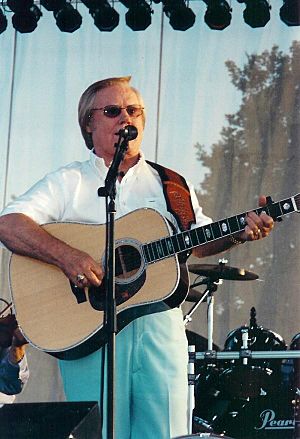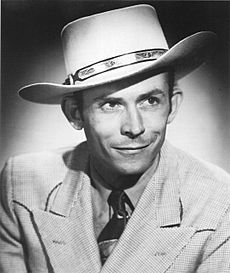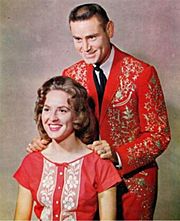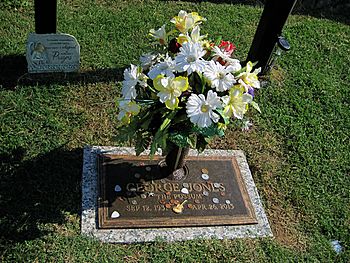George Jones facts for kids
Quick facts for kids
George Jones
|
|
|---|---|

Jones performing in Metropolis, Illinois, in 2002
|
|
| Born |
George Glenn Jones
September 12, 1931 Saratoga, Texas, U.S.
|
| Died | April 26, 2013 (aged 81) Nashville, Tennessee, U.S.
|
| Resting place | Woodlawn Memorial Park Cemetery |
| Occupation |
|
| Years active | 1953–2013 |
| Spouse(s) |
Dorothy Bonvillon
(m. 1950–1951)Shirley Ann Corley
(m. 1954–1968)Nancy Sepulvado
(m. 1983) |
| Children | 4 |
| Musical career | |
| Also known as | King George, Thumper Jones, The Possum, No Show Jones |
| Genres | |
| Instruments |
|
| Labels |
|
| Associated acts |
|
| Military Service | |
| Allegiance | |
| Service/ |
|
| Years of service | 1951–1953 |
| Rank | Private |
| Awards | National Defense Service Medal |
George Glenn Jones (born September 12, 1931 – died April 26, 2013) was an American country singer and songwriter. He became famous worldwide for his many hit songs. His most well-known song is "He Stopped Loving Her Today". People also loved his unique voice and singing style.
For the last 20 years of his life, many called Jones the greatest living country singer. Country music expert Bill Malone said that Jones would get completely lost in his songs. This made listeners feel the same emotions. Because of his nose and face, Jones was nicknamed "The Possum". He was also called "The Rolls-Royce of Country Music". He had over 160 hit songs from 1955 until he passed away in 2013.
Born in Texas, Jones first heard country music at age seven. He received a guitar when he was nine. Early musicians who inspired him were Roy Acuff and Bill Monroe. Later, the styles of Hank Williams and Lefty Frizzell helped shape his singing. He married Dorothy Bonvillon in 1950. He served in the United States Marine Corps and finished his service in 1953. He married Shirley Ann Corley in 1954. In 1959, Jones recorded "White Lightning". This song, written by The Big Bopper, launched his career as a singer. He later married fellow country music singer Tammy Wynette in 1969. After that marriage, Jones married his fourth wife, Nancy Sepulvado, in 1983. Jones passed away in 2013 at 81 years old.
Contents
Life and Career Highlights
Early Life and Music (1931–1953)
George Glenn Jones was born on September 12, 1931, in Saratoga, Texas. He grew up in Colmesneil, Texas, with his brother and five sisters. His father, George Washington Jones, played harmonica and guitar. His mother, Clara, played piano at their church. When George was seven, his parents bought a radio. This was when he first heard country music.
Jones remembered listening to the Grand Ole Opry with his parents. He would ask his mother to wake him if he fell asleep. He wanted to hear singers like Roy Acuff or Bill Monroe. A historian named Robert K. Oermann said that George became a "chronic singer." This means he just had to sing. His father bought him his first guitar when he was nine. George learned his first songs at church. Young George also played music on the streets of Beaumont for money.

At 16, he left home and went to Jasper, Texas. There, he sang and played on the KTXJ radio station. He also worked at the KRIC radio station. During one show, Jones met his hero, Hank Williams. Jones later wrote that he "just stared." In a 1989 film, Jones said, "I couldn't think or eat nothin' unless it was Hank Williams." He added, "He had to be, really, the greatest." He married Dorothy Bonvillion in 1950. He joined the United States Marines and served until 1953. He was stationed in San Jose, California, during his service.
First Recordings and Hits (1954–1957)
Jones married Shirley Ann Corley in 1954. His first song, "No Money in This Deal", was recorded in January 1954. It came out in February on Starday Records. This started his work with producer H.W. "Pappy" Daily. The song was recorded in the living room of Starday Records' co-founder, Jack Starnes. Jones also worked at the KTRM radio station in Beaumont.
A deejay there, Slim Watts, started calling him "George P. Willicker Picklepuss Possum Jones." This was partly because of his short haircut and nose. In his early recordings, Daily told Jones not to sound too much like Hank Williams or Lefty Frizzell. Jones's first big hit was "Why Baby Why" in 1955. That same year, Jones met and played with Elvis Presley and Johnny Cash. Jones became a lifelong friend of Johnny Cash. Jones was invited to sing at the Grand Ole Opry in 1956.
When Elvis Presley became very popular in 1956, Jones was asked to record some rockabilly songs. He didn't really want to, but he agreed. He later joked that he used those records as Frisbees. He said he was "desperate" and "hungry" at the time. He even used the name "Thumper Jones" for those songs.
Jones moved to Mercury in 1957. He teamed up with singer Jeannette Hicks and had another top-10 song called "Yearning". Starday Records joined with Mercury that year. Jones had more success with his first Mercury song, "Don't Stop the Music." Jones was still playing in small, local music halls.
Becoming a Star (1959–1964)
In 1959, Jones had his first number one hit on the Billboard country chart. It was "White Lightnin'", written by J. P. Richardson, also known as the Big Bopper. Johnny Cash said that George Jones could have been a great rockabilly artist.
Jones was also a successful songwriter. He wrote or helped write many of his biggest hits. Some of these became classic songs. These include "Window Up Above" and "Seasons of My Heart". He also wrote "Just One More" and "Life To Go". Jones often wrote songs with his childhood friend Darrell Edwards.
Jones signed with United Artists in 1962. He quickly had one of his biggest hits, "She Thinks I Still Care". His voice became deeper during this time. He started to develop his unique singing style. While with United Artists, Jones recorded tribute albums to Hank Williams and Bob Wills. He also made an album of duets with Melba Montgomery. This included the hit "We Must Have Been Out of Our Minds".
When Jones toured, he was always backed by his band, the Jones Boys. Many talented musicians played in his band. These included Johnny Paycheck, who later became a star himself.
Comeback Success (1980–1990)
By 1980, Jones had not had a number-one song in six years. Many thought his career was slowing down. But in April, "He Stopped Loving Her Today" was released. It quickly went to number one on the country charts. It stayed there for 18 weeks. The song tells the story of a man who loves someone until he dies. Jones's singing made the song feel very real and sad.
This song is often called one of the greatest country songs ever. Jones himself did not like the song at first, calling it "morbid." But he later said it saved his career. He won a Grammy Award for Best Male Country Vocal Performance in 1980. The song also won Single of the Year and Song of the Year awards.
The success of "He Stopped Loving Her Today" led to new interest in Jones. He had a TV special on HBO called George Jones: With a Little Help from His Friends. In it, he sang with other stars like Waylon Jennings and Tammy Wynette. In 1981, Jones told a reporter, "I saved it all for the songs." He meant he showed his feelings mostly through his music.
In 1982, Jones recorded the album A Taste of Yesterday's Wine with Merle Haggard. Jones continued to have hits in the early 1980s. These included "I'm Not Ready Yet", "Same Ole Me", "Still Doin' Time", and "Tennessee Whiskey". His last number one hit was "I Always Get Lucky with You" in 1984.
In 1981, Jones met Nancy Sepulvado. She helped him get his finances in order and managed his career. Jones always said she saved his life. Jones released several albums during the 1980s. His video for the 1985 hit "Who's Gonna Fill Their Shoes" won an award.
Later Years and Passing (1990–2013)
In 1990, Jones released his last album on Epic, You Oughta Be Here With Me. He then moved to MCA Records. His first album with MCA, And Along Came Jones, came out in 1991. It sold better than his previous album. However, his songs did not get much radio play. Country music was changing in the early 1990s.
His last album to get a lot of radio play was 1992's Walls Can Fall. It included the song "I Don't Need Your Rockin' Chair". This song showed he was still full of life. Even without much radio play, Jones kept recording and touring. He was inducted into the Country Music Hall of Fame in 1992.
In 1996, Jones released his autobiography, I Lived To Tell It All. He wrote that he never took his career seriously, but it was still doing well. He also shared his disappointment with how country music had changed. He felt he was removed from radio for younger, pop-influenced singers. Despite this, many country stars like Garth Brooks and Alan Jackson honored Jones. They respected him as a true country legend.
In 1998, The Nashville Network started The George Jones Show. Jones hosted the show, chatting with country stars and performing music. Guests included Loretta Lynn, Johnny Paycheck, and Merle Haggard.
Jones continued to make high-quality music. His most popular song in his later years was "Choices" from his 1999 album Cold Hard Truth. He won another Grammy for this song. The song caused some discussion when the Country Music Association asked him to perform a shorter version at an awards show. Jones refused and did not go. Alan Jackson showed his support by playing part of Jones's song during his own performance.
On March 6, 1999, Jones was in a car accident near his home. He was taken to the hospital and released two weeks later. After the accident, Jones released The Gospel Collection in 2003. He also sang at a Johnny Cash Memorial Concert in 2003. In 2008, Jones received the Kennedy Center Honor. President George W. Bush said he had many of Jones's songs on his iPod. Rolling Stone magazine named him number 43 in their list of 100 Greatest Singers of All Time. In 2012, Jones received the Grammy Lifetime Achievement award.
On March 29, 2012, Jones went to the hospital for a breathing infection. He was hospitalized again in May. On August 14, 2012, Jones announced his farewell tour, called the Grand Tour. His final concert was in Knoxville on April 6, 2013.
Jones was set to perform his very last concert on November 22, 2013. However, on April 18, 2013, he was taken to the hospital. George Jones passed away on April 26, 2013, at age 81. Many people, including former First Lady Laura Bush, spoke at his funeral on May 2, 2013. Other speakers included Tennessee Governor Bill Haslam and news personality Bob Schieffer. Country singers like Alan Jackson, Randy Travis, and Vince Gill performed musical tributes. The service was broadcast live on TV and radio. Jones was buried in Woodlawn Cemetery in Nashville. After his death, many country radio stations played his songs all day. "He Stopped Loving Her Today" even re-entered the country charts.
George Jones's Legacy
Jones always stood up for country music. He told Billboard in 2006, "I sing because I love it." He also helped promote younger country singers who loved the music as much as he did. Alan Jackson said in 1995 that George was like "some old guy that works down at the gas station" even though he was a legend.
After Jones passed away, Andrew Mueller wrote that he was "one of the finest interpretive singers." This means he was great at singing songs and making them feel real. Nick Tosches described Jones's voice as having "exceptional range, natural elegance, and lucent tone." David Hajdu wrote that Jones's singing was "handsome and strange." He said Jones's voice made beautiful sounds no matter the words.
David Cantwell said that Jones would use his own memories and feelings when he sang. This made his performances very real. Rich Kienzle said Jones could make a sad song into a powerful cry of pain. In 1994, country music historian Colin Escott said that modern country music is built on respect for George Jones. Waylon Jennings sang, "If we all could sound like we wanted to, we'd all sound like George Jones." After Jones's death, Merle Haggard said his voice was like a "Stradivarius violin." Emmylou Harris wrote that Jones made a song "a work of art."
Producer Billy Sherrill said that Jones's singing style never changed.
Influence Beyond Country Music
George Jones mostly stuck to country music. His songs rarely played on mainstream pop music stations. But his strong loyalty to country music earned him respect from musicians in many different styles. Frank Sinatra once called Jones "the second-best singer in America."
In 1969, Bob Dylan said that George Jones's "Small Time Laboring Man" was the best song released that year. Dylan also wrote that he didn't listen to much country music in the early 1960s, "Outside of maybe George Jones." Country rock musician Gram Parsons loved George Jones. He covered Jones's song "That's All It Took". Parsons also helped Keith Richards of The Rolling Stones get interested in country music.
After Jones's death, Keith Richards wrote that Jones had "the most touching voice." Richards remembered hearing Jones sing for the first time in 1964. He said, "when George got up, we went whoa, there's a master up there." Mick Jagger also said Jones was one of his favorite country singers.
John Prine mentions Jones in his songs. Elvis Costello had a hit in the UK when he covered "A Good Year for the Roses" in 1981. Elliott Smith said his idea of Heaven was George Jones singing all the time. Leonard Cohen praised Jones's album Cold Hard Truth. The day Jones died, Cohen performed "Choices" as a tribute. Robbie Robertson of The Band said Jones was "the Ray Charles of country music." Robert Plant said he listens to George Jones every day.
James Taylor wrote "Bartender's Blues" with Jones in mind. He said Jones's voice was like a steel guitar. Other artists who recorded with Jones include Mark Knopfler, the Staple Singers, and Linda Ronstadt. In 1995, Burt Reynolds wrote, "He is to country music what Spencer Tracy is to movies."
Duets and Collaborations
George Jones was a great harmony singer. He recorded many duets throughout his career. His songs with Tammy Wynette are the most famous. But Jones said his duets with Melba Montgomery were his best. Jones also recorded albums with Gene Pitney and Johnny Paycheck. His album with Paycheck, Double Trouble (1980), was different for him. It showed him singing songs like "Maybelline."
Jones also recorded other duet albums:
- My Very Special Guests (1979)
- A Taste of Yesterday's Wine with Merle Haggard (1982)
- Ladies Choice (1984)
- Friends In High Places (1991)
- The Bradley Barn Sessions (1994)
- God's Country: George Jones And Friends (2006)
- Kickin' Out The Footlights...Again with Merle Haggard (2006)
- Burn Your Playhouse Down (2008)
Discography
Number-one Country Hits
- "White Lightning" (1959)
- "Tender Years" (1961)
- "She Thinks I Still Care" (1962)
- "Walk Through This World with Me" (1967)
- "We're Gonna Hold On" (with Tammy Wynette) (1973)
- "The Grand Tour" (1974)
- "The Door" (1975)
- "Golden Ring" (with Tammy Wynette) (1976)
- "Near You" (with Tammy Wynette) (1977)
- "He Stopped Loving Her Today" (1980)
- "Still Doin' Time" (1981)
- "Yesterday's Wine" (with Merle Haggard) (1982)
- "I Always Get Lucky with You" (1983)
Images for kids
See also
 In Spanish: George Jones para niños
In Spanish: George Jones para niños
- Academy of Country Music
- List of country musicians
- Country Music Association
- List of best-selling music artists
- Inductees of the Country Music Hall of Fame (1992 inductee)
 | Bayard Rustin |
 | Jeannette Carter |
 | Jeremiah A. Brown |




